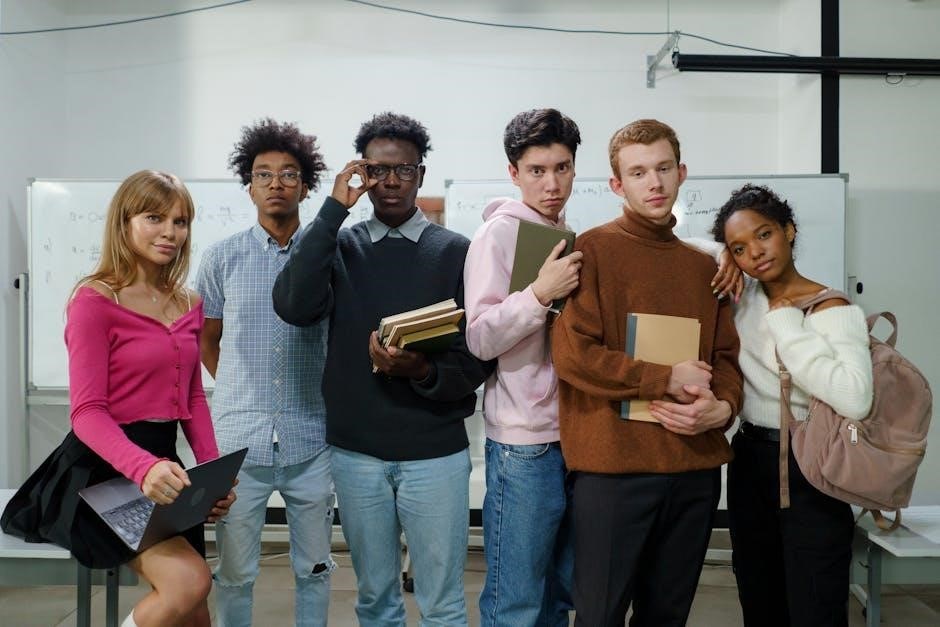
Social Learning Theory, developed by Albert Bandura, explains how people acquire knowledge and behaviors through observation and imitation in a social context, emphasizing cognitive and environmental influences.
1.1 Overview of Social Learning Theory
Social Learning Theory, formulated by Albert Bandura, posits that individuals acquire behaviors, knowledge, and attitudes through observation and imitation of others in a social context. It extends beyond traditional behaviorist theories by incorporating cognitive processes, emphasizing how people learn by watching models and understanding the consequences of their actions. This theory highlights the interplay between environmental factors and personal cognition in shaping behavior.
1.2 Importance of Observational Learning
Observational learning is a cornerstone of Bandura’s Social Learning Theory, demonstrating that individuals acquire behaviors by observing and imitating others. This process allows learners to gain insights into new behaviors, understand their consequences, and develop skills without direct experience. Bandura’s famous Bobo doll experiments highlighted how observing models influences behavior, underscoring the significance of this mechanism in learning and development across various contexts, from education to social interactions.
Key Concepts of Bandura’s Social Learning Theory
Bandura’s Social Learning Theory emphasizes observational learning, imitation, and modeling. It highlights the role of reinforcement, reciprocal determinism, and cognitive processes in shaping behavior.
2.1 Observation, Imitation, and Modeling
Bandura’s Social Learning Theory underscores the significance of observation, imitation, and modeling in acquiring behaviors. Observing others’ actions and their consequences enables individuals to learn new behaviors without direct experience. Imitation involves replicating observed behaviors, while modeling refers to learning by observing and imitating specific patterns. These processes are fundamental to how individuals acquire skills and adopt social norms.
2.2 Role of Reinforcement in Learning
Reinforcement plays a crucial role in Bandura’s Social Learning Theory, influencing behavior through rewards or punishments. Direct reinforcement involves receiving consequences for one’s actions, while vicarious reinforcement occurs when individuals observe others being rewarded or punished. This process teaches learners about the outcomes of behaviors, shaping their actions and motivating them to repeat or avoid specific conduct based on observed or experienced consequences.
Historical Development of the Theory
Bandura’s Social Learning Theory evolved from behaviorist roots, emphasizing cognitive processes; Introduced in the mid-20th century, it was formally outlined in his 1977 publication.
3.1 Bandura’s Contributions to Psychology
Albert Bandura revolutionized psychology by introducing Social Learning Theory, emphasizing observation, imitation, and cognitive processes. He challenged behaviorist views, highlighting the role of environment and cognition in shaping behavior. His work on self-efficacy and reciprocal determinism further expanded psychological understanding, influencing fields like education, health, and policy. Bandura’s theories remain foundational, earning him a legacy as one of psychology’s most influential figures.
3.2 Evolution from Behaviorist Theories
Bandura’s Social Learning Theory evolved from traditional behaviorist theories by integrating cognitive processes. Unlike strict behaviorism, which focused on direct reinforcement, Bandura emphasized observation and imitation, introducing the concept of vicarious learning. This shift acknowledged the role of mental processes and social interactions, providing a more comprehensive understanding of how behaviors are acquired and maintained in dynamic environments.

Reciprocal Determinism
Reciprocal determinism, a core concept in Bandura’s theory, describes the dynamic interaction between behavior, personal factors, and environmental influences, emphasizing mutual causation and continuous influence.
4.1 Interaction Between Person, Behavior, and Environment
Reciprocal determinism highlights the bidirectional interaction between a person’s behavior, their internal factors (e.g., beliefs, self-efficacy), and external environmental influences. Behavior shapes and is shaped by personal and environmental elements, creating a dynamic interplay. This concept challenges traditional theories by emphasizing mutual causation, where individuals actively influence their surroundings while being influenced by them, forming a continuous cycle of interaction.
4.2 Role of Cognitive Processes
Cognitive processes play a central role in Bandura’s theory, as they mediate learning and behavior. Attention, memory, and self-efficacy enable individuals to interpret and process information from observations. These mental processes allow learners to evaluate modeled behaviors, consider their consequences, and decide whether to imitate them. Cognitive functions also facilitate self-regulation, enabling individuals to control their actions and adapt behaviors based on contextual factors, making learning a dynamic and thoughtful process.

Applications of Social Learning Theory
Social Learning Theory is widely applied in education, therapy, and behavioral interventions, helping to develop skills and reduce aggressive behaviors by modeling positive actions and outcomes.
5.1 Education and Skill Development
Social Learning Theory significantly impacts education by emphasizing observation and imitation. Teachers act as models, demonstrating skills and behaviors students emulate. This approach enhances learning through active participation and feedback, fostering a collaborative environment. Bandura’s theory encourages educators to use positive reinforcement and clear modeling to promote effective skill development and academic achievement among students. This method is widely adopted in various educational settings.
5.2 Understanding Aggressive Behavior

Bandura’s Social Learning Theory explains aggressive behavior as learned through observation and imitation of models. Individuals observe others’ aggressive actions and their consequences, learning whether such behavior is rewarded or punished. This vicarious learning process influences their likelihood of replicating aggression. The theory highlights the role of environmental factors and reinforcement in shaping aggressive tendencies, offering insights for behavioral interventions to reduce such behaviors.

Criticisms and Challenges
Critics argue that Social Learning Theory overlooks internal motivations and biological factors, focusing too much on observational learning and environmental influences, narrowing its explanatory scope.
6.1 Limitations of the Theory
Social Learning Theory has been criticized for its limited scope in addressing internal motivations and biological influences. It primarily focuses on observational learning, potentially overlooking innate drives and genetic factors. Additionally, the theory’s reliance on environmental interactions may not fully capture the complexity of human behavior, particularly in cases where internal states or unconscious processes play a role. This narrow focus can restrict its application in understanding certain psychological phenomena.
6;2 Comparisons with Other Learning Theories
Social Learning Theory differs from Behaviorism by emphasizing observation and cognition, whereas Behaviorism focuses solely on external stimuli and responses. Compared to Cognitive Theory, SLT integrates environmental factors more deeply, providing a bridge between internal thought processes and external influences. This holistic approach sets it apart, offering a more comprehensive understanding of learning and behavior compared to narrower, isolated theories like classical or operant conditioning.
The Role of Self-Efficacy
Self-efficacy, a belief in one’s ability to succeed, influences motivation and behavior. It stems from direct experiences, observation, and social persuasion, shaping an individual’s confidence and persistence.
7.1 Definition and Sources of Self-Efficacy
Self-efficacy, defined as an individual’s belief in their ability to succeed, originates from four sources: direct experience, observation of others, verbal persuasion, and physiological states. Bandura highlights these factors as crucial in shaping one’s confidence and behavior, influencing motivation and goal-setting across various contexts, from education to personal development, emphasizing the cognitive processes underlying human action and decision-making.
7.2 Influence on Behavior and Learning
Self-efficacy profoundly influences behavior and learning by determining an individual’s motivation, persistence, and resilience. People with high self-efficacy are more likely to engage in challenging tasks, exhibit perseverance, and adapt to new situations. This belief in one’s capabilities fosters a positive mindset, enhancing problem-solving skills and academic performance, while low self-efficacy can hinder progress and limit opportunities for growth and development in various domains.

Bandura’s Social Cognitive Theory
Social Cognitive Theory expands Social Learning Theory, emphasizing cognitive processes, self-efficacy, and reciprocal determinism, illustrating how behavior, environment, and personal factors interact dynamically to influence learning and behavior.
8.1 Expansion of Social Learning Theory
Social Cognitive Theory expands Bandura’s earlier work by incorporating cognitive processes, emphasizing self-efficacy and reciprocal determinism. It explores how individuals regulate behavior through observation, imitation, and self-regulation, highlighting the dynamic interaction between personal factors, behavior, and environmental influences. This expansion provides a comprehensive framework for understanding human learning and behavior, addressing complexities beyond the original Social Learning Theory.
8.2 Key Differences and Additions
Social Cognitive Theory differs from Bandura’s original Social Learning Theory by emphasizing cognitive processes like self-efficacy, moral agency, and self-regulation. It introduces the concept of reciprocal determinism, where behavior, personal factors, and environment mutually influence one another. This addition provides a deeper understanding of human agency and motivation, moving beyond mere observational learning to address complex psychological mechanisms driving behavior and development.
Practical Implications and Research
Social Learning Theory informs behavioral interventions, therapy, and education, emphasizing observational learning and self-efficacy. Research supports its effectiveness in understanding and modifying behaviors across diverse contexts.
9.1 Use in Therapy and Behavioral Interventions
Social Learning Theory is widely applied in therapy and behavioral interventions, focusing on observational learning and modeling; Therapists use this approach to help individuals observe and imitate positive behaviors, reducing harmful actions. It is particularly effective in addressing aggressive behaviors, as it enables understanding of behavioral consequences. This method also aids in developing coping strategies and promoting self-efficacy, making it a valuable tool for fostering positive behavioral change in various clinical settings.
9.2 Empirical Support and Studies
Bandura’s Social Learning Theory is supported by extensive empirical research. Studies demonstrate that observational learning significantly influences behavior, with evidence from experiments on aggression and self-reinforcement. Bandura’s 1977 work showed children learn by observing models, while a 2022 systematic review highlighted self-efficacy’s role in workplace behavior. These studies validate the theory’s effectiveness in understanding behavioral acquisition and change across diverse contexts, reinforcing its practical applications in psychology and education.
Bandura’s Social Learning Theory provides a comprehensive framework for understanding human behavior, emphasizing observation, imitation, and the interaction between behavior and environment, with lasting impact on psychology;

10.1 Summary of Key Points
Bandura’s Social Learning Theory highlights observation, imitation, and modeling as key mechanisms. It emphasizes the role of cognitive processes and reciprocal determinism, where behavior, person, and environment interact. The theory also introduces self-efficacy, influencing behavior and learning. It has broad applications in education, therapy, and understanding aggression, providing a dynamic and comprehensive view of human behavior and development.
10.2 Future Directions in Social Learning Theory
Future research may explore technology’s role in social learning, such as digital platforms and virtual modeling. Integrating cognitive neuroscience could deepen understanding of observational learning mechanisms. Expanding cross-cultural studies could enhance the theory’s global applicability. Additionally, addressing contemporary issues like online behavior and social media’s impact on learning could provide new insights, ensuring the theory remains relevant in evolving social and technological landscapes.